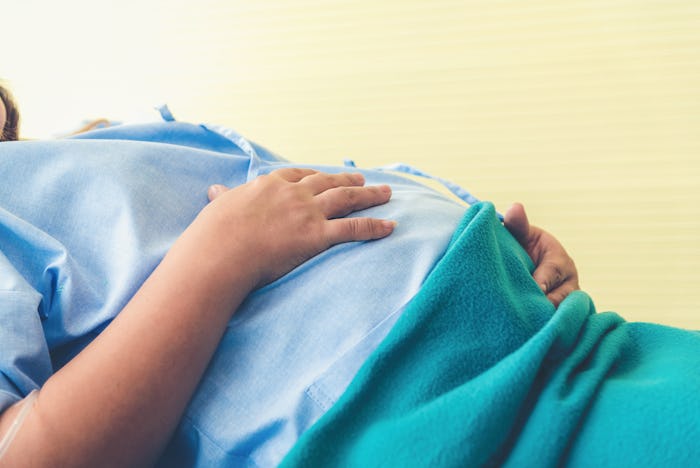News

Apparently COVID-19 Might Injure The Placenta In Pregnant Women, Study Says
Up until now, there hasn't been much talk about how the current pandemic is affecting pregnant women. A recent Northwestern Medicine study is shedding some light on the subject, but the news isn't necessarily good: The research suggests that pregnant women with COVID-19 may develop a placenta injury, leading to abnormal blood flow between mother and child in utero. What does that mean? If you're expecting, don't panic... it might not be as bad as it sounds.
The good news? All but one of the women involved in the study delivered healthy babies who tested negative for the coronavirus, according to CNN. However, every woman's placenta showed evidence of injury. Researchers have cautioned their findings could be suggestive of a potential new complication of COVID-19 in pregnant women that would require close monitoring from doctors.
In a study published late last week in The American Journal of Clinical Pathology, researchers examined the placentas from 16 women who tested positive for COVID-19 while pregnant and delivered at Northwestern Medicine Prentice Women’s Hospital in Chicago, Illinois. Pathological exams showed evidence of injury on all 16 women's placentas, a concerning sign considering the organ's crucial function.
"Not to paint a scary picture, but these findings worry me," Northwestern Medicine obstetrician Dr. Emily Miller, co-author of the study, said in a statement.
As one of the first organs to form within the uterus during pregnancy, the placenta plays a vital role. As the Mayo Clinic explained, it supplies oxygen and other nutrients from the mother to the fetus while also carrying waste away from the growing fetus.
Researchers at Northwestern Medicine found that 80% of the placentas they examined showed evidence of vascular malperfusion, an injury that can hinder the flow of blood from mother to fetus. What's more, 40% of the 16 placentas had blood clots. When comparing the results to historical controls, researchers found that 55% of placentas within the historical comparison group showed signs of vascular malperfusion and only 9% had blood clots.
"Most of these babies were delivered full-term after otherwise normal pregnancies, so you wouldn't expect to find anything wrong with the placentas," Northwestern Medicine pathologist Dr. Jeffrey Goldstein, the study's senior author and an assistant professor of pathology at Northwestern University Feinberg School of Medicine, said in a statement to Northwestern Now News. "But this virus appears to be inducing some injury in the placenta."
Injuries that may impact placental blood flow could potentially hinder fetal growth and development, leading to a low birth weight, birth defects, or even premature birth, according to Healthline. While Goldstein and his research team didn't find evidence of negative outcomes among any of the live infants born to study participants (15 of the women delivered live infants in their third trimesters while one woman miscarried in her second trimester), they believe their findings indicate that pregnant women who contract COVID-19 should be closely monitored.
"It doesn't appear to be inducing negative outcomes in live-born infants, based on our limited data, but it does validate the idea that women with COVID should be monitored more closely," Goldstein said. "There is an emerging consensus that there are problems with coagulation and blood vessel injury in COVID-19 patients. Our finding support that there might be something clot-forming about coronavirus, and it's happening in the placenta."
It's not immediately clear if when a woman contracts COVID-19 during pregnancy plays a significant role in the overall health of her placenta. According to the study, four of the women sought treatment for potential COVID-19 symptoms between three to five weeks before they delivered. The remaining 12 patients tested positive for COVID-19 when they came in to deliver. Five of the 16 women were asymptomatic and never developed symptoms.
Goldstein told Reuters he hopes more studies are done regarding pregnancy and the novel coronavirus, including ones that follow babies born to COVID-19 positive mothers to determine if their long-term growth and development is impacted by the virus.
Studies referenced:
"Placental Pathology in COVID-19," May 2020, Elisheva D Shanes, MD, Leena B Mithal, MD, MSCI, Sebastian Otero, Hooman A Azad, Emily S Miller, MD, MPH, Jeffery A Goldstein, MD, PhD, American Journal of Clinical Pathology, https://doi.org/10.1093/ajcp/aqaa089